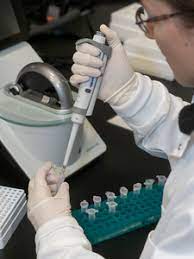How can the computer chip predict the future of gene synthesis?
Creating synthetic life could be easily within our grasp soon based on a comparison with the evolution of computer chip. Computer programming and gene synthesis appear to share little in common. But according to an expert, leaps forward in technology in the former make him optimistic that wide scale gene manufacture is achievable.
Computer programming and gene synthesis appear to share little in common. But according to University of Cincinnati professor Andrew Steckl, an Ohio Eminent Scholar, leaps forward in technology in the former make him optimistic that wide scale gene manufacture is achievable.

The article highlights the comparison and similarities between biological and digital coding languages in terms of alphabet, words and sentences. However, the authors underline that DNA coding — the combinations the adenine, guanine, thymine and cytosine that make up a genome — only tells part of the complex story of genes and omits things like epigenetics.
Moore’s Law is a predictive model for the advancement of computer chips. Named for computer scientist Gordon Moore, co-founder of Intel, it suggests that advances in technology allow for exponential growth of transistors on a single computer chip.

And 55 years since Moore drafted his theory. We’re still seeing it at work in three-dimensional microchips. Even if the advances provide smaller benefits in performance and power reduction than previous leaps forward.
Since 2010, the study said, the price of editing genes and synthesizing genomes has roughly halved every two years in much the way Moore’s Law suggests.
Chip : The Study
“This would mean that synthesizing an artificial human genome could cost approximately $1 million dollars. And simpler applications like a custom bacterium could be synthesized for as little as $4,000. The authors said in the study.
“This combination of surmountable complexity and moderate cost justifies the academic enthusiasm. For synthetic biology and will continue to inspire interest in the rules of life,” the study concluded.
Likewise, Steckl said bio-engineering could become integral to virtually every industry and science. In much the same way computer science evolved from a niche discipline to a critical component of most every science.











